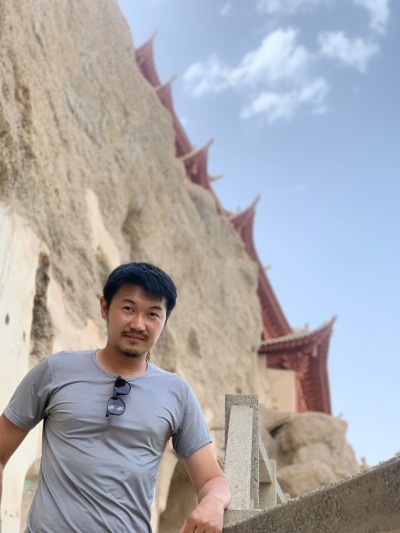 |
|
Tao stands in front of the Buddhist grottoes in Gansu's Dunhuang. [Photo provided to China Daily] |
Code of the road
That said, motorcycles can be relatively dangerous, especially on bone-juddering roads that melt in the rain.
"I have, of course, a fear of falling, of crashing on my motorbike and what that would do to my body," Nielsen says.
"But what if I encounter people who have fallen, who have crashed on the road. Then, what do I do?"
He discovered the answer when they came across a man whose scooter had flipped with a "lump the size of a ham under his pants".
They worried his broken leg bone may cause perhaps-fatal internal bleeding and rushed to get help.
"I knew we have to act fast," Nielsen says.
The man and his female companion thanked them when first responders arrived.
"We drove off without knowing anything else about this couple. They'll just know the story of two foreigners who came by and helped them mysteriously, and then just disappeared," Nielsen says.
He points out that embassies, tourism agencies and insurance companies had advised against getting involved in such situations for fear of liability.
"But, for me, the code of the road tells me I have to. Because if I find myself in the same situation, something as basic as karma is at stake here. And I would hope that people would help me if I trash myself on the road," he says.
"When I talk about the code of the road, I think there's something more fundamental at stake here, which is to ask ourselves-it doesn't matter whether we are foreigners or Chinese-this is just about what kind of world do we want to live in."
Nielsen did fall off his bike once, without injury, when they spent four hours swishing to and fro-as if their motorbike were a spastic fish-to grumble 12 kilometers up a mucky two-track whittled into mountainsides in Gansu. There, falling off the road might mean falling off the mountain.
"There's a feeling of, 'There's nothing else to do'," Nielsen says.
"There's no other way you can get through that situation than to just pull through."
Tao recalls using sticks to scrape away the guck engorged beneath the mud flap.
"This clay can be molded. And, in some ways, it molded the motorcycle-and certainly our moods," he says.
Nielsen says: "There's still some of that clay on the motorbike now, even though I drove thousands of kilometers after that. Some of the clay you find out west is stubborn as heck."
They also carried enough extra food and water for a day or two, especially when traveling through vast uninhabited areas.
"You never know when the motorbike may give up or have some problem that forces you to stop on the road," Nielsen says.
"There are a lot of these (unpopulated) areas where you can really be in trouble if you don't have enough food or water and you break down. There isn't much to do aside from stock up on food, gasoline and water, and drive safely."
They recall giving water to a man whose motorcycle had broken down in no-man's land.
Nielsen, who was a member of the Danish Scout Council for 15 years, slept in a tent about a quarter of the nights, depending on if he could find a place to stay.
He specifically enjoyed camping near the Yellow and Yangtze rivers, on the Qinghai-Tibet Plateau's grasslands and on various mountains.
"Sometimes, you put up the tent in the dark. And as the dawn breaks, you can see stunning views from just the opening of your tent."
And, when Nielsen found a place where bonfires weren't forbidden while camping, he would use local ingredients to prepare meals. For instance, in Qinghai province, he substituted yak for beef to make a version of the French dish, bourguignon.
"It was very good," he says, smiling.